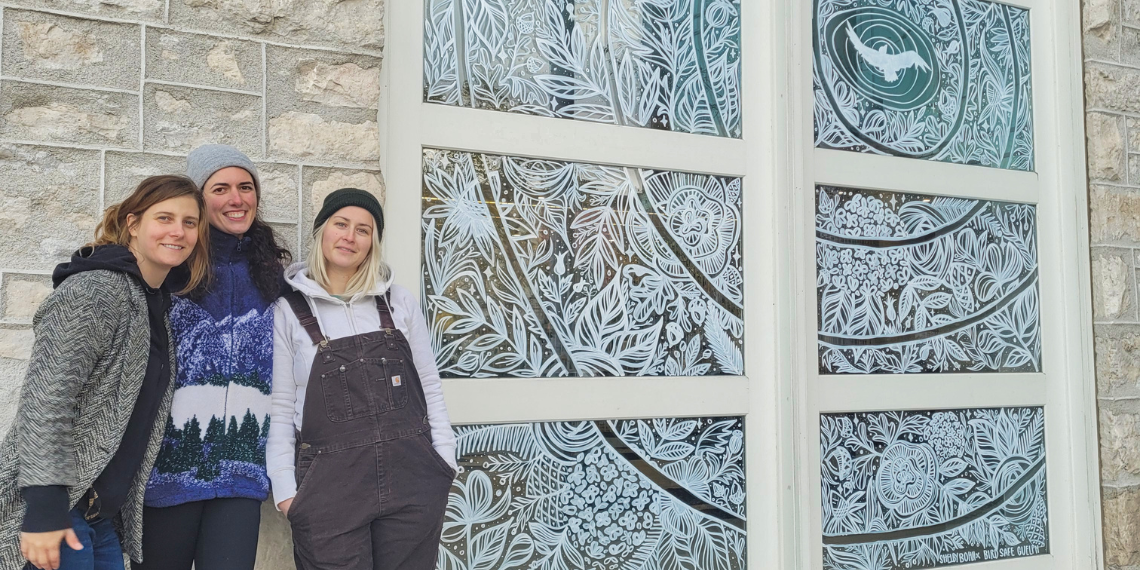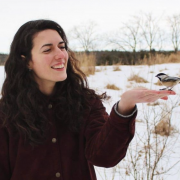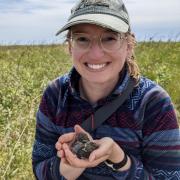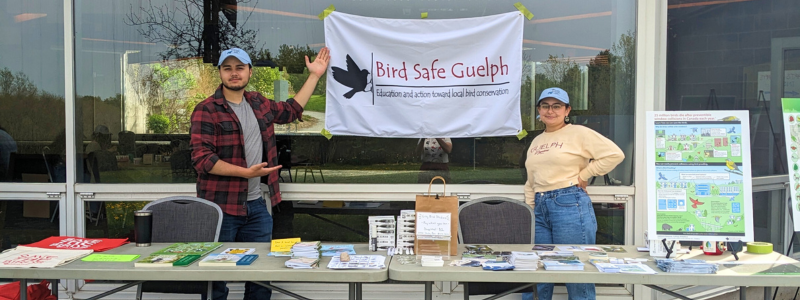Bird Safe Guelph, led by Integrative Biology students, works to make city and university safe for birds

An estimated 269 million birds are killed every year in Canada because of human activities and infrastructure, with collisions with windows and vehicles and hunting from pet cats leading the list of culprits.
Bird Safe Guelph, a group of dedicated volunteers made up primarily of undergraduate and graduate students from the Department of Integrative Biology at the University of Guelph, has been working to address these problems in the Guelph area through a variety of projects and programs, all backed by current research on the problem.
 “Because our members come with a research background, we take a very research-centred approach to the work we do,” says Bird Safe Guelph founder Hayley Spina and Integrative Biology PhD student. “We look for the science. When we’re thinking about what problems to tackle, our first step is to dig into the literature to better understand the issues and the damage they cause.”
“Because our members come with a research background, we take a very research-centred approach to the work we do,” says Bird Safe Guelph founder Hayley Spina and Integrative Biology PhD student. “We look for the science. When we’re thinking about what problems to tackle, our first step is to dig into the literature to better understand the issues and the damage they cause.”
Since the group was formed in 2020, they have succeeded in raising awareness of the challenges facing birds and the simple steps that can be taken to reduce fatalities, both within the university and in the wider Guelph community.
The group runs a collision-monitoring research program on the University of Guelph campus, tracking the windows that get the most collisions, to better advise the university on which buildings to prioritize for retrofits.
They offer an educational program for children focusing on the challenges faced by birds, with in-person presentations for children from kindergarten to Grade 6 in the Guelph area and printable educational materials for teachers, in English and French, with Spanish materials to come.
And every year in May, they host the popular Guelph Bird Day event at the university Arboretum, with guided bird walks, family-friendly activities and booths, in collaboration with Integrative Biology’s Wild Ontario, the university’s Sustainability Office, Biodiversity Inventory and OPIRG Guelph, as well as Nature Guelph and local business Wild Birds Unlimited.
The projects also benefit the student volunteers, who learn important skills, such as networking, community outreach, project management, leadership and communication skills. It’s also an opportunity to meet other students who share similar interests and passions and to collaborate on a topic they feel strongly about.
 “It’s good training for us as scientists, because as students and researchers, we might not always get as much experience in the outreach, education and advocacy side of conservation,” says Sarah Mueller, Bird Safe Guelph lead coordinator and PhD student working with Dr. Ryan Norris.
“It’s good training for us as scientists, because as students and researchers, we might not always get as much experience in the outreach, education and advocacy side of conservation,” says Sarah Mueller, Bird Safe Guelph lead coordinator and PhD student working with Dr. Ryan Norris.
Bird Safe Guelph began during the height of the COVID-19 pandemic in 2020. Spina, a PhD student in Dr. Amy Newman’s lab, had planned to travel to New Brunswick to study the Savannah sparrow, but a provincial lockdown forced her to stay home. Instead, she went looking for ways to get involved in conservation efforts in the community.
After being inspired by fellow Integrative Biology graduate students Shelby Bohn and Alex Sutton, who had been working to raise awareness of the problem of window collisions on campus, Spina decided to start a group on campus and applied for a start-up grant from the World Wildlife Federation and Chantiers Jeunesse. With that $2,000, they prepared educational materials and purchased enough decals to make the windows of 140 Guelph-area homes safe for birds.
A few months later, working with the University of Guelph, Bird Safe Guelph encouraged the university to retrofit the bus shelters on the campus bus loop with white dots designed to break the windows’ reflection. Additionally, they convinced the university to update their policies for future buildings to align with the Canadian Standards Association Bird Friendly Building Design Standard. The Honeybee Research Station, in construction now, is being built to meet these bird-safe standards, for instance.
In the community, they helped lead the City of Guelph’s efforts to be named a Bird Friendly City, with the black-capped chickadee as its designated bird, and painted the windows of Guelph City Hall. As part of that designation, they hosted the inaugural Guelph Bird Day on World Migratory Bird Day in 2022. Since then, Guelph Bird Day has grown in popularity, with more than 200 visitors last year.
“Education is one of our primary goals and I think we have been getting the word out that birds are dying, even within our own city, and there are easy ways to prevent it from happening,” says Spina.

Bird Safe Guelph volunteers James Alexander and Christina Kourakos
This year’s event, on Saturday, May 11 from 9 a.m. to 1 p.m. will include guided bird walks in the Arboretum, fun family-friendly activities and free bird-themed swag. This year’s theme is insects, which play a vital role as a food source for migratory birds, both during the breeding season and along their migratory journeys.
Interested in joining Bird Safe Guelph? The group is looking for volunteers to support both existing projects and to bring in new ideas in support of bird conservation. Anyone is welcome to join, including students, faculty, staff and community members. New volunteers are accepted every year in September.